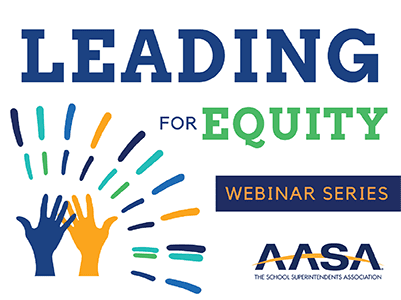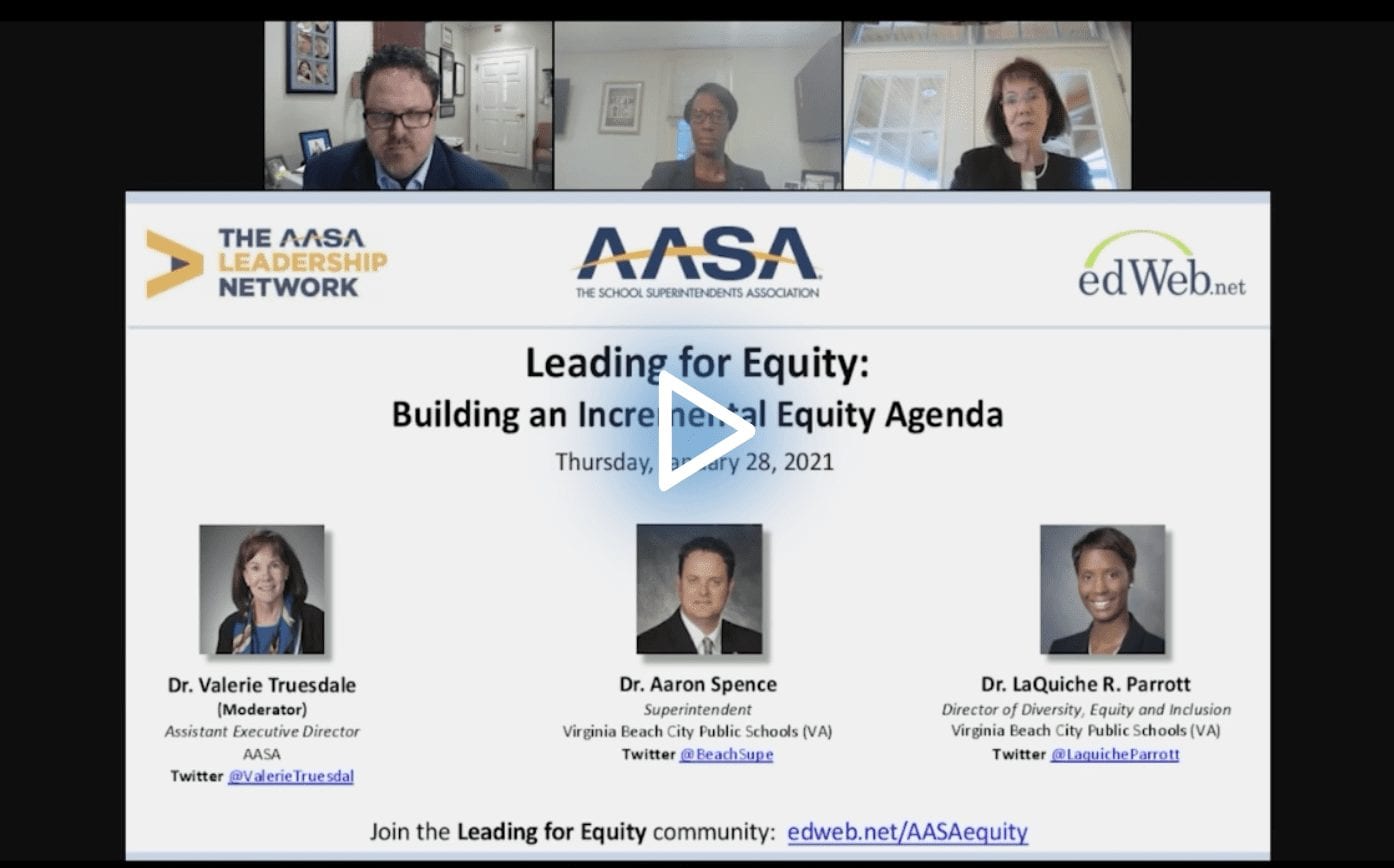Embedding Equity Across a District and Community
By Stacey Pusey
Leaders in the Virginia Beach City Public Schools have been working on their equity agenda since 2015. But while their first two iterations focused more on achievement gaps and access to rigorous classes for all students, the plans didn’t address systemic inequities or really move the needle forward. During a recent edWebinar, hosted by AASA, The School Superintendents Association and AASA’s Leadership Network, Dr. Aaron Spence, Superintendent, and Dr. LaQuiche R. Parrott, Director of Diversity, Equity and Inclusion, explained why their Compass 2025 plan emphasizes equity throughout and how they keep equity front and center in their work.
First, the district formed a Student Discipline Task Force, charged with looking at the research and taking a deep dive into policies and practices that disproportionately affected specific student populations, especially African American males. By addressing disciplinary policies, they were ensuring the kids were in class and able to take advantage of opportunities. From this work, they came up with five steps that inform their approach today.
- Train for transformation with professional learning focused on cultural competency and implicit bias.
- Provide mental health and behavioral support for students and teachers.
- Adopt mediation as a restorative practice with specific language on how to use it.
- Implement Positive Behavioral Interventions and Supports (PBIS) practice.
- Create an Office of Opportunity and Achievement and have one person in thinking about equity every day.
Then, they created an Equity Council composed of internal and external stakeholders, including students, teachers, central office staff, community members, and two appointed school board members. In March 2020, they began examining the district’s equity framework, and identified key areas to address.
- Accountability: where have they moved the needle, what should they keep doing, and where have they fallen down?
- Resources: Provide more support at the central level to implement the framework districtwide.
- Respect: Students wanted teachers to know who they are as individuals and know who their teachers are as well.
- Professional learning: Require all staff to take courses on culturally responsive practices—and it should not be invitational.
- Staffing: Diversify teachers, leadership, and staff at every level to reflect the community.
Finally, they shared recommendations for embedding equity in a district’s culture.
- Create an Educational Equity Policy covering curriculum and instruction, communication, and enforcement. Make sure the commitment begins with the school board.
- Keep the focus on equity—every conversation you have in the school is an equity conversation. Ground these conversations in data to improve teaching and learning, to set priorities, and to keep everyone focused. Engage those closest to the data in the conversations.
- Reexamine practices—assess what is and isn’t working. The presenters’ district is undertaking an equity assessment to see where they are in reaching their 2025 goals. For example, they renamed the Office of Opportunity and Achievement to Diversity, Equity and Inclusion because no one understood the name or the intent of the original title.
- Model these core values to the community and communicate your policies with them.
Dr. Spence reminded attendees that while he knows district leaders are currently dealing with the pandemic, they can’t stop pursuing an equity agenda. They need to be thinking ahead to what children will need when the pandemic is over. “Know that we can be better for children with intentionality because every child deserves access to excellent teaching and learning every day,” he said.
This edWeb broadcast was hosted by AASA, The School Superintendents Association and AASA’s Leadership Network, providing premier professional learning for educational leaders.
About the Presenters
Dr. Aaron Spence
A passionate and visionary leader in public education for nearly three decades, Dr. Aaron Spence is committed to ensuring that all students have access to the rigorous coursework, innovative learning opportunities and resources they need to prepare them for success in college, the military or the workforce. Dr. Spence has served as Superintendent of Virginia Beach City Public Schools (VBCPS) since June 2014, responsible for the instructional leadership and administrative operation of 86 schools and centers that serve more than 67,000 students. He is credited with creating and fostering a work culture where differences are celebrated, and the input and opinions of more than 10,000 employees are welcomed and valued.
During his time in Virginia Beach, Dr. Spence has led division efforts to systematically address equity and poverty issues and their resulting impacts on academic achievement, student engagement and discipline. In selecting Dr. Spence as the 2018 Virginia Superintendent of the Year, the Virginia Association of School Superintendents cited his strategies as a “textbook example of leadership necessary to make large-scale changes in an organization that produce significant changes and positive results.”
Examples of that strategic work include an intentional focus on equity at both the division and school level; an analysis of high poverty areas in relation to location of schools struggling to meet accreditation benchmarks; and the development of a new tiered school improvement support model. Additionally, Dr. Spence took a detailed review of disproportionalities in discipline data (specifically for African American students and students with special needs) and established a Student Discipline Task Force made up of teachers, administrators, parents and community members. This task force was charged with reducing the number of suspensions administered throughout the division; closing the disproportionate gaps that existed in the number of suspensions and/or expulsions; and maximizing instructional time for all students in the classroom.
As a result of these and other ongoing efforts, VBCPS has been 100 percent accredited for four consecutive years, discipline reports showcase a decline in referrals and suspensions, and more students are enrolled in and achieving at higher levels in honors and advanced classes than ever before.
Dr. LaQuiche Parrott
Dr. LaQuiche Parrott is the director of Diversity, Equity, and Inclusion for Virginia Beach City Public School. Dr. Parrott leads the development and implementation of proactive diversity, equity, and inclusion initiatives in support of the Division’s strategic plan to create a teaching and learning environment where all have an opportunity to succeed. She works across offices, departments, and community members to assess, identify, and address inequitable practices and procedures that have historically or are currently resulting in inequities of opportunities for students and staff. Dr. Parrott champions the value of diverse and inclusive teaching and learning environments and leads the development of a vision and effective strategy to create a culture for diversity, equity, and inclusion. Prior to the role as director, she served as an elementary school principal and taught at the elementary level.
She is a proud graduate of a Historically Black College and University (HBCU), Virginia State University. She completed her Master of Education degree from Regent University, along with an endorsement in Educational Leadership. She earned her Doctor of Education from Virginia Polytechnic Institute and State University in Educational Leadership and Policy Studies. Dr. Parrott is active outside of the division in her sorority, Alpha Kappa Alpha Sorority, Incorporated, and serves on the board of a non-profit organization focused on eliminating racism.
About the Host
Dr. Valerie Truesdale joined AASA early in 2019 as the assistant executive director responsible for guiding leadership development services and programs. With years of experience in the superintendency and roles in instructional technology, she knows that AASA’s Leadership Network can be a substantial resource for school leaders trying to keep pace with the rapidly changing delivery of K-12 education.
Join the Community
Leading for Equity is a free professional learning community on edWeb.net for school and district leaders who face many challenges leading schools and driving school improvement for all students, especially now with COVID-19.
The AASA Leadership Network drives superintendent success, innovation, and growth, shaping the future of public education while preparing students for what’s next. We are the largest, most diverse network of superintendents in America. Passionate and committed, we connect educational leaders to the professional learning, leadership development, relationships, and partnerships they need to ensure a long career of impact.
Stacey Pusey is an education communications consultant and writer. She assists education organizations with content strategy and teaches writing at the college level. Stacey has worked in the preK-12 education world for 20 years, spending time on school management and working for education associations including the AAP PreK-12 Learning Group. Stacey is working with edWeb.net as a marketing communications advisor and writer.






Comments are closed.